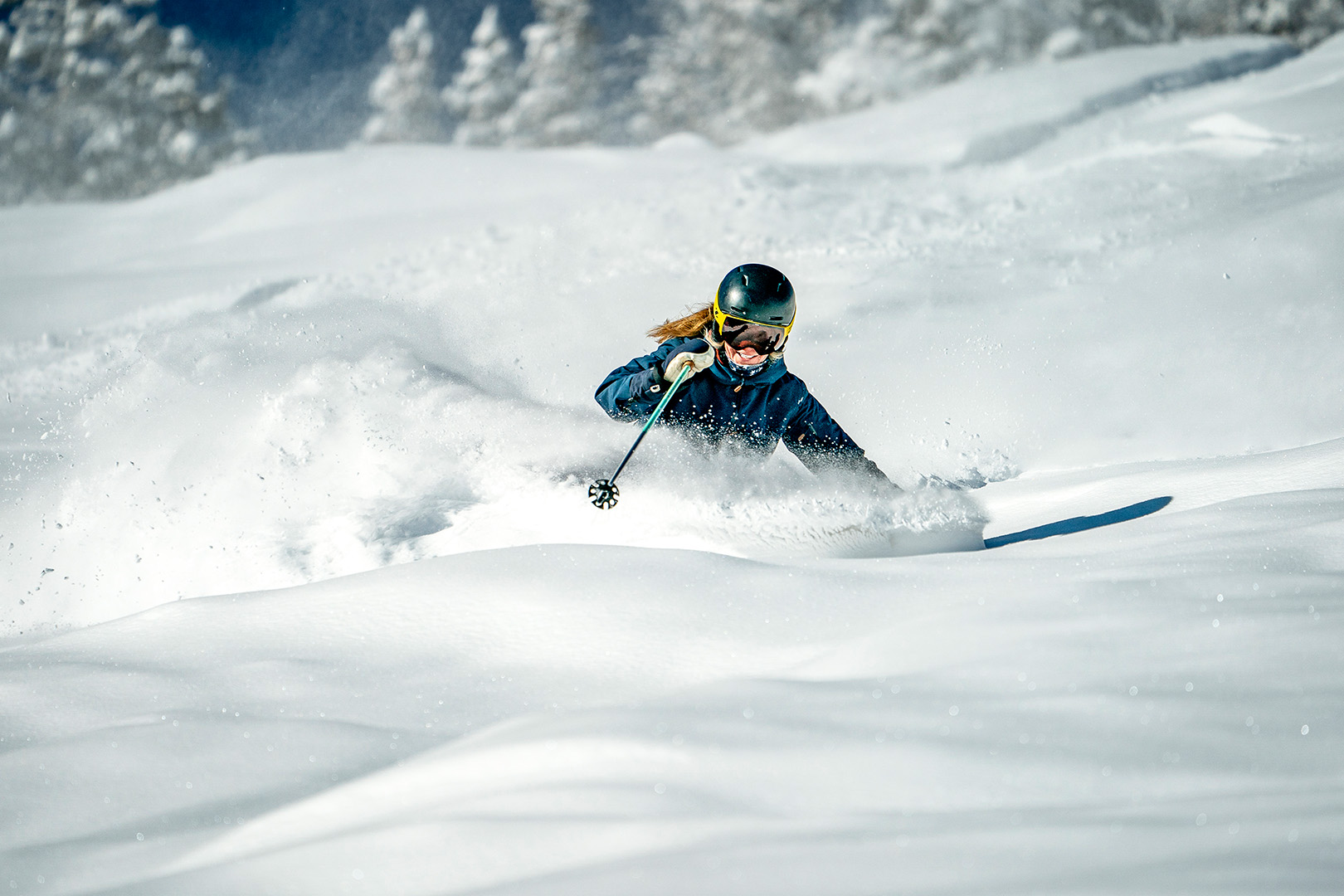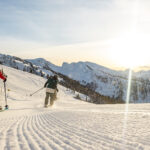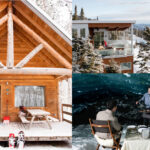
ASK AN ENORMOUS QUESTION, THE ANSWERS ARE BOUND TO GO DEEP
I have this image. My father, vital in his forties, broad shoulders and tapered waist. I am a child and he is skiing ahead of me in a red jacket on a white Colorado piste. We are alone. It’s snowing and the wind is high. Great gusts sweep across the mountain’s face. Snow swirls and lifts, drawing and redrawing an opaque curtain. Ahead my father disappears, appears, disappears again. Still, I continue on and so does he. I’m not afraid. I trust, simply, that my dad will lead me.
Another image, a decade later. My mother pushing her tips over a Whistler ridge. I am older now, skiing on my own. I wave from the lift but she doesn’t see, so intent is she on penning her signature into fresh snow. As she descends, a plume of cold smoke lifts from her heels. She’s gone before I skid onto the ridge, but I see her presence still there, drawn like calligraphy on an all-white slate.
Ask me why I ski, decades later, and I will tell you: I’m looking for those moments. My mother. My father. Their marks in the snow. I’m looking for that. I’m looking for them.
Why do you ski?
It’s a question I like to ask. I type the question into Facebook, Instagram, and countless emails. I phrase it the same way, over and over, every time. Why do you ski?
Initially, I get short answers. Sometimes a single word or phrase.
“Freedom.”
“Fresh air.”
“For the people we meet.”
“It’s my happy place.”
“It’s the most perfect way to move in winter.”
“It keeps me young.”
“It allows me to move my old body in gravity-defying ways.”
“For the après.”
“Because skiing is better than sex.”
If I go deeper, I get deeper insight. “I love the view from the top of the lift,” says Melissa, “it makes me feel incredibly tiny.” A woman named Annie gives me three words: “Fun, family, connection.” A man named John says he can sense an overnight snowfall “even before I open my eyes in the morning, because the sound is different.” And a stranger called Deidre tells me skiing is how she expresses her moods. “Ski fast, ski slow, ski through the trees, hit jumps—it’s all based on how I’m feeling that day.” I imagine Deidre as a harried ski mom, wordlessly chewing out her kids: Uh-oh, Mom’s pissed! She’s ramming bumps on Gunbarrel again.”
Sometimes answers to Why do you ski? are haunting or heartbreaking, like Vivian’s, who suffers depression: “Skiing is the one thing that has never failed to give me joy.” And Gregg’s, who sighs as he says, “Skiing is just so much. It shapes, informs, and lifts me.” He adds, “Since you asked, I haven’t been able to get this question out of my mind.”
It’s true, the answer to Why do you ski? is often layered with candy-coloured icing. Those curvy Obermeyer girls and busty Lange women of the ’70s made us yearn to ski, even if it’s now taboo to say so. Sun Valley was built on the Hollywood promise of apple-cheeked brunettes and barrel-chested men on snow with names like Ernest and Gary. In the ’80s, sunny, snowy television ads by ChapStick, Mars Bar and Juicy Fruit were “aspirational.”

Sometimes answers to Why do you ski? are haunting or heartbreaking.

And let’s not forget the lure of friendship and kinship drawing us to the slopes. I re-read Jon Krakauer’s Into Thin Air. Despite the risk and the doom of his Everest climb, he talks about climbing as giving him a “sense of community.” I can’t help drawing a parallel to skiing. I think of those cocky guys in Greg Stump’s rockumentaries buddying up to dance down Chamonix’s Couloir Poubelle—Frankie Goes To Hollywood on soundtrack and Stumpy telling us extreme skiing is “a game where losing means checking out for good.” Or I think of the Bay Street skiers who race to Revelstoke every year for hits of adrenaline, like Vegas only with cleaner air. It’s what Krakauer calls a “high-altitude fraternity.” As skiers, our closest friends are often other skiers. My father’s advice: “Make sure you marry a skier.”
THIS IS MY QUEST
Once, I asked this question of Ken Read, the Crazy Canuck who won multiple World Cup downhills because he was considered… well, crazy. Ken, I asked, why do you ski? He answered simply that he is on a lifelong “elusive quest” for the perfect turn. “On five occasions I found it,” he says. No surprise, those five occasions were Read’s wins on the greats: Val d’Isère, Chamonix, Schladming, Wengen, and Kitzbhühel’s fearsome Hahnenkamm. “It just clicked,” he says. “I felt ‘as one’ with the skis and snow. I could totally relax, let the skis run.” That’s why Ken skis, he wants that feeling to return.
Read isn’t alone in citing a mystical force, one taking the helm, steering him toward a win, or at least toward exaltation on snow. Ask nearly any heli-skier—it doesn’t matter where—and you’ll hear the words “Mecca” and “mind blowing” and “other worldly”, as if some higher power took control of their skis at 3,000m.
In her revered, cultish tome Deep Powder Snow, the late author, philosopher and environmentalist Dolores LaChappelle talks about a flow state. It is the act of finding bliss in skiing by giving in—not to skiing the mountain, but to the mountain skiing you. As she writes in Deep Powder Snow (1993), “I discovered that I was not turning the skis, but that the snow was. I then quit trying to control the skis and turned them over to these forces. Once this rhythmic relationship with snow and gravity is established on a steep slope, there is no longer an ‘I’, but a continuous flowing interaction that has no boundaries.”
Trippy, huh?
The book is out of print and hard to find, but, like most special things, it’s worth the search. LaChapelle draws the inevitable link between ‘how to ski’ and ‘how to live.’ She ends it by suggesting we be “fully aware of the earth and the sky and the gods and you, the mortal, playing among them.”
It is trippy. But it makes you think.
IT’S A SLIPPERY SLOPE
Perhaps the closest I’ve come to connecting with an answer to Why do we ski? came from a book called It’s a Slippery Slope by playwright Spalding Gray. When I came upon it, I read it front-to-back in a single morning, then read it again. It’s about learning to ski, but also about learning to cope. And it’s the first time I’ve encountered a writer able to put the elation of the sport into words. “Then there we were in Aspen, Colorado,” Gray writes as a brand new skier, “me pacing back and forth in the Jerome Hotel like a moonstruck lad and looking out the window at Ajax Mountain… and coming down it were all these little gods and goddesses like toy soldiers with white rooster tails shooting out of their ski boots. I said, ‘Ramona, we must go up and see the gods and goddesses come down…’”
As he becomes more proficient at the sport, Gray compares a ski slope to a “white Garden of Eden” where “we were dancing in the day.” Gray describes being out of balance most of his life, yet finding balance in skiing. “In those rare moments,” he writes, “I feel hints of perfection. It’s like Zen, but not as subtle.” And then, on a day he’s finally in tune with the slope, he goes all spiritual, all Dolores LaChapelle: “Only to see and feel it as it came, and then to let it go, or not even that, because there was no letting go since there was no containment, no memory, only flow…”
And that’s it, in a nutshell. Gray’s euphorics prove that the replies to my question, Why do you ski?, can be enormous, elusive. Defining the riddle is like catching the wind.
Perhaps the simple answer is the most useful. It comes from a colleague, Peter Kray, who wrote The God Of Skiing, a love letter, Hemingway-style, to the sport. “Why don’t I ski?” Kray asks in return. “Every time I go to the hill, on the drive home I usually end up thinking, “Why do anything other than skiing?”




